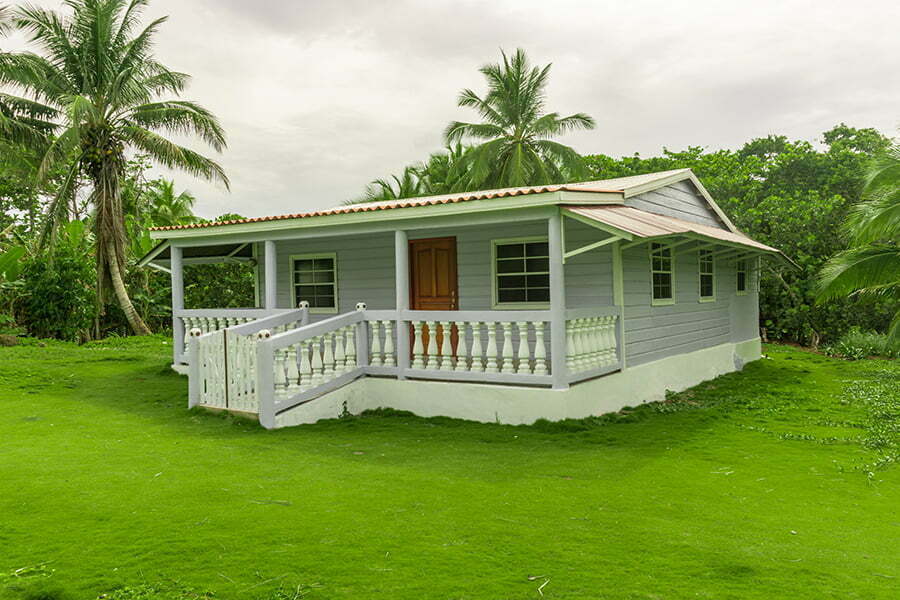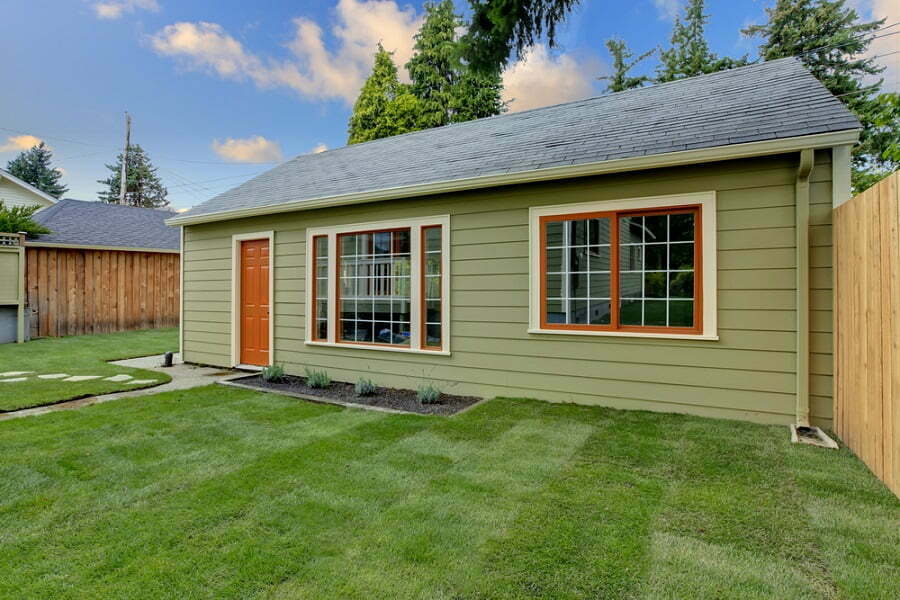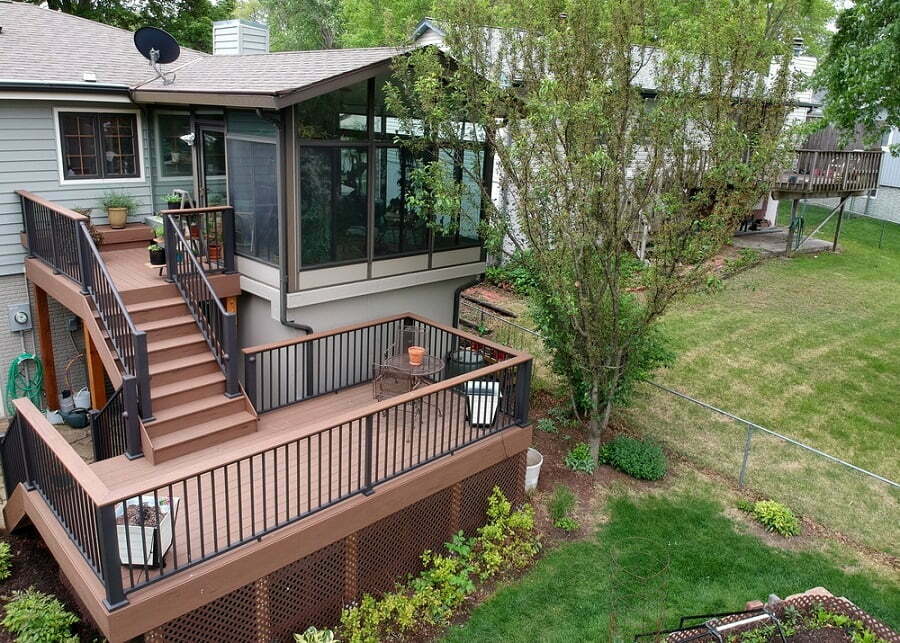Last updated on
FHA loans are the most popular option for financing a prefab home thanks to their favorable terms. Conventional construction loans otherwise work too.
If you qualify for an FHA loan, that’s your best option. But you can always finance your new prefab home or its renovation through more conventional financing options, such as construction loans or personal loans. Other special financing programs such as USDA or VA loans are also available for manufactured housing.
You should consider all of these factors when deciding which type of financing works best for you.
If you want to finance a prefab home, it may be best to look into a loan with a lower down payment or no down payment at all. You might even qualify for a zero percent interest rate for up to five years.
You should also research whether your lender offers unique programs for prefabricated homes. For example, some lenders offer a zero percent interest rate if you pay off your mortgage early.
Many builders offer their unique financing options, including a 30-year fixed-rate mortgage.
FHA Loans

HUD offers mortgage insurance for borrowers who qualify under FHA guidelines — Title I and Title II loans.
Title I Loan
A Title I loan allows you to buy a new or used manufactured house or modify, fix up, or improve an existing manufactured home.
In some cases, lenders may be able to provide Title I mobile home loans even when buyers don’t own the land where they plan to place their homes. Typically, these homes will be located within a manufactured home community or trailer park. In order to qualify for a loan from a bank, borrowers need to be able to prove ownership of the property where their mobile homes will sit.
Title II Loan
As long as the borrower has enough equity in their existing property (i.e., they own the land lot), then he/she may be eligible for financing from this lender.
You cannot qualify for a mortgage unless you intend to reside in the property as your primary residence. Investors who wish to purchase investment properties must seek out other financing options such as Title I loans.
Manufactured homes built on rented land in manufactured housing communities or mobile home parks may not qualify under Title II. A down payment for a Title II mortgage is from 3.5%. Terms can be anywhere between 10 and 30 years.
Construction Loan
Traditional financing is the most common way for people who buy their first home to finance their purchase. Banks are generally willing to make loans for primary residences because people tend to be motivated to pay back mortgages to maintain the value of their property. Homeowners who own their own homes tend to be committed to staying in their house for more extended periods, and thus banks often prefer them as borrowers.
Mortgage lenders want proof you’ve got enough money to pay back the loan, but if you’re buying a house without a down payment, no bank account or credit card statement is showing how much cash you have available. You’ll need to prove you can afford the payments by providing a detailed financial plan.
USDA and VA Loans
There are many great mortgage options available today. A Federal Housing Administration Home Purchase Mortgage requires a 3.5% down payment. Still, other great options include the Department of Agriculture Rural Development Loan Program, Veterans Administration, and U.S. Government National Mortgage Association. These loans typically require lower down payments and shorter-term mortgages. Contact our office to learn more about your options.
Modular Home Financing
To protect yourself from delays or other problems, you must be compensated as construction proceeds. As such, you must receive payment as the house is being built. You cannot wait until completion to get paid because you may never complete any unforeseen circumstances.
You obtain a “mortgage,” which is a long-term loan. You pay back the mortgage by making monthly installments until your house is paid off.
You do not need to get a construction loan since the dealer or GC will finance the entire cost of the house. However, they may want to see proof that you have enough money to buy the home before financing it.
Approval Process for Prefab Home Financing
You must prove that you can afford the amount being borrowed to get a mortgage. You also need to show how much money you plan to spend on living expenses while owning the house. In addition, it is important to choose the best bank account that matches your financial needs.
Your lender needs to see that your financial situation will be stable enough to repay the loan. As part of this process, lenders often require appraisals to determine the property’s value. An appraisal shows the current market value of the home. If the price is too low, the bank may decide not to lend you the money. On the other hand, if the price is too high, the bank might feel that you’re taking unfair advantage of them by borrowing more than you can afford.
Financing Your New Home with a Mortgage Refinance
Homeowners looking to refinance their current mortgages often face a dilemma: Should I refinance my current mortgage or go with a new loan? Both options have advantages and disadvantages, so weighing those benefits against each other is essential. Here are three things to keep in mind when making your decision.
What Is My Current Interest Rate?
You can usually lock in a low-interest rate when refinancing your current mortgage. It’s essential to know your current interest rate because you could save hundreds of dollars over the life of your loan.
How Much Can I Save By Refinancing?
Some homeowners choose to refinance their current mortgage because they think they can save thousands of dollars. But how much money can you save by refinancing? That depends on several factors, such as the number of your monthly payments, your credit score, and the length of your loan term.
Will I Be Able to Get Approved for a Lower LTV?
When you refinance your current mortgage, you may get approved for a lower LTV. This means that you may be able to borrow more than 80% of the total value of your home instead of 70%. While this option may sound appealing, it does require higher monthly payments.
Do I Have Any Closing Costs?
Refinancing your current mortgage requires paying closing costs like appraisal fees and title charges. When you compare these costs to the savings, you will receive by refinancing, you may realize that you don’t save anything.
Am I Eligible for Government Programs?
Many government programs help people who purchase a home. If you are eligible for one of them, you may not need to worry about paying private mortgage insurance. PMI is an extra fee that you must pay every month using a conventional mortgage.
Does My Credit Score Matter?
Your credit score matters when it comes to getting a mortgage. If you have good credit, you may get a better interest rate. However, if your credit isn’t great, you may still be able to get a loan.
Are There Other Options Available?
If you aren’t sure which way to go, other options are always available. Some people prefer to buy a new home rather than refinance. Others prefer to sell their existing property and move into a smaller place.
Will I Still Qualify for the Same Loan Program After Refinancing?
Even though you may qualify for a different type of loan after refinancing, you should check to ensure that you will still qualify for the same program. You never want to lose out on a benefit because you changed lenders.
How Long Will It Take to Close on My Refinance?
You may be able to close on your refinance within days or even hours. However, some lenders take weeks or months to process your paperwork.
Will I Need To Pay Private Mortgage Insurance?
You might be required to pay private mortgage insurance when you refinance your current home. PMI is an additional fee that you must pay at least until your loan-to-value ratio reaches 80%. Once that happens, you won’t have to pay PMI anymore.
How Much Will Closing Cost Me?
Closing costs vary depending on where you live. In most parts of the country, you will only pay 1% to 2% in closing costs. But in areas with high real estate prices, you could end up paying 5% or 6% in closing costs.
What Is the Best Time of Year to Refinance?
The best time to refinance your home is during the summertime. During the winter, rates tend to rise faster than during the summer.
Price
Prefab homes tend to be cheaper to buy than traditional houses because most are made from precast concrete panels rather than brick and wood. They are more energy-efficient and easier to maintain.
They also usually come with warranties that protect against defects such as mold and termites.
Cost of Land
You should always consider what it would cost to develop the land before buying it so that you don’t end up paying too much for something that isn’t worth it. Many retailers offer prefab home and land packages that can help you reduce the overall cost.
If you are going to buy a property, make sure that you have done your homework and know exactly what you want out of it. You need to see yourself living in the house for years to come. If you can’t picture yourself there, then maybe this is not the right place for you!
When purchasing real estate, it’s essential to understand how long it will take to sell.
Benefits of Financing a Prefab Home
When you finance a prefab home with a low down payment, you can save thousands of dollars in closing costs. Most prefabs are priced between $50,000 and $75,000.
Some prefab homes are designed to fit a lot that already has a foundation. Others are designed to sit on top of a slab.
Most prefabs are built with recycled materials, so they are environmentally friendly.
Prefab homes are often custom-built to your specifications. Some are designed to accommodate wheelchairs or disabled people.
Homeowners who finance their prefab home with a zero percent interest rate can enjoy a long period of low monthly payments.
FAQ
No, you can’t refinance a foreclosed home, but you may still qualify for other financing options.
It depends on what you plan to do with your home. If you plan to stay in the house for less than five years, you may be able to find a fixed-rate mortgage that has low monthly payments.
An adjustable-rate mortgage allows your lender to adjust your payment based on changes in market rates. This means that your initial payment may be higher than a fixed-rate mortgage. However, your payment may become lower than a fixed-rate mortgage payment once your ARM adjusts.
Table of Contents

![How Much Does an ADU Cost? [Solved]](https://buildgreennh.com/wp-content/uploads/2022/08/ADU-Tax-Deductions-and-Benefits.jpg)
![How to Build an ADU? [Step-by-Step]](https://buildgreennh.com/wp-content/uploads/2022/08/Why-Are-You-Building-an-ADU.jpg)

